Blue swimming crab sustainability: a shared goal in the Philippines
BLUE SWIMMING CRAB SUSTAINABILITY: PHILIPPINES’ SHARED GOAL by Global Marine Commodities Project on Exposure
BLUE SWIMMING CRAB SUSTAINABILITY: PHILIPPINES’ SHARED GOAL by Global Marine Commodities Project on Exposure
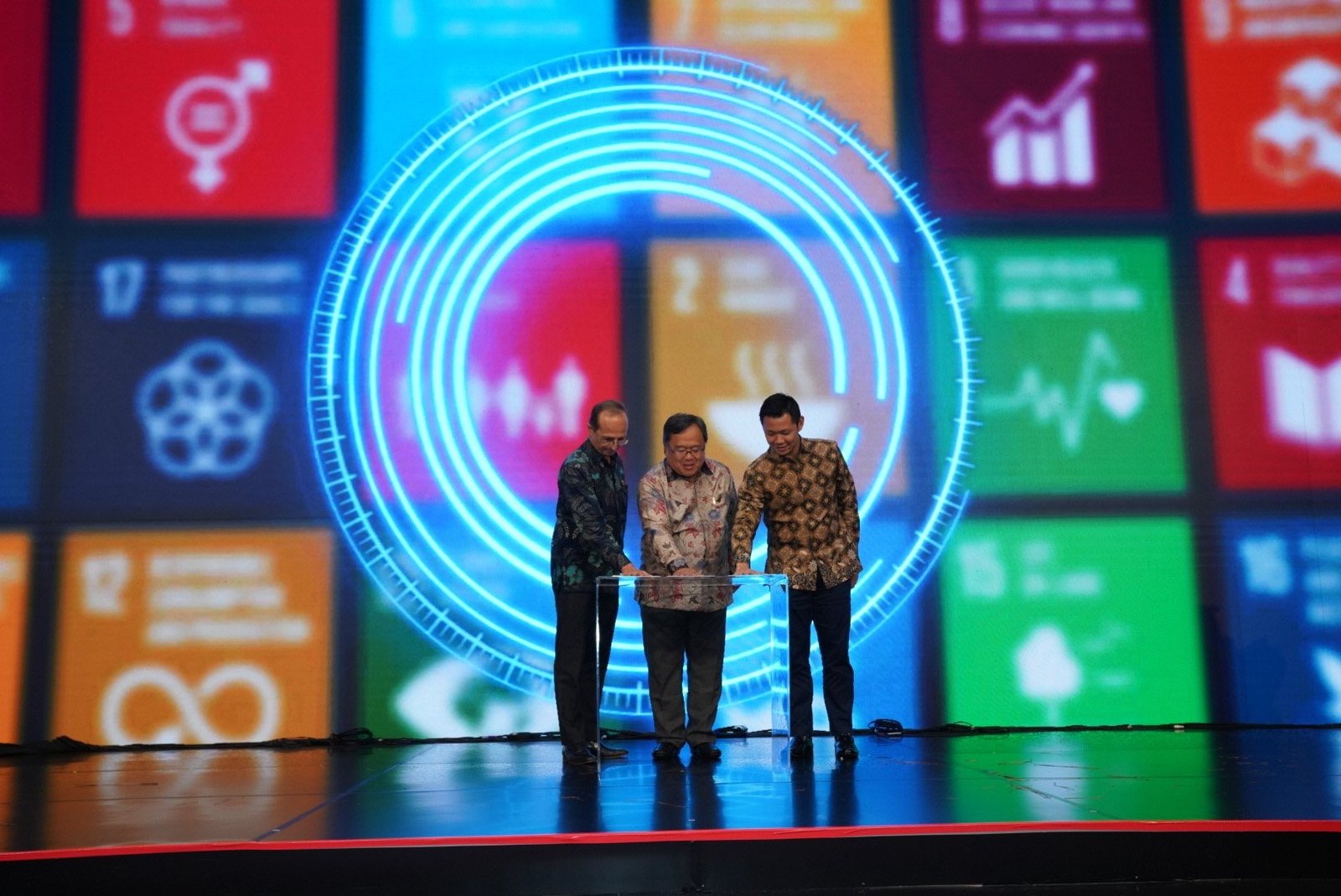 United Nations Development Programme (UNDP) and Ministry of National Development Planning/BAPPENAS host a plenary on Tuesday 8 October 2019, in Jakarta, to discuss the roles of Pesantren (Muslim boarding school in Indonesia) in supporting achievement of SDG14: Life Below Water.
United Nations Development Programme (UNDP) and Ministry of National Development Planning/BAPPENAS host a plenary on Tuesday 8 October 2019, in Jakarta, to discuss the roles of Pesantren (Muslim boarding school in Indonesia) in supporting achievement of SDG14: Life Below Water.
This plenary is part of the lndonesia SDGs Summit 2019, 8-9 October 2019, which this year focus on marine conservation to improve welfare and reduce inequality. The plenary is opened by Minister Bambang PS Brodjonegoro of BAPPENAS, and Chair of Nadhlatul Ulama KH. Said Aqil Siroj. The panel discussion is consisting of Deputy Minister for Maritime and Natural Resources of BAPPENAS, Director of Early Education and Islamic School of Ministry of Religious Affairs, chair of RMI-NU, coastal pesantren “Tarbiyatut Tholabah” Lamongan, and moderated by Luky Adrianto, Dean of Faculty of Fisheries and Marine Science of IPB University. Participants are representative from related ministries and agencies and about 100 pesantren from coastal area of DKI Jakarta, Banten and West Java.
There are more than 25 thousand pesantren in Indonesia, including many are in the coastal regions where community dependency to marine and coastal resource are high. As there are strong socio-economic and cultural ties between pesantren with nearby/surrounded communities, pesantren can play strategic roles as an agent of transformation, with its own uniqueness, to improve capacity of human resources, contribute to economic development in coastal regions, as well as proactively involve in promoting good governance and sustainable management of marine and fisheries resources.
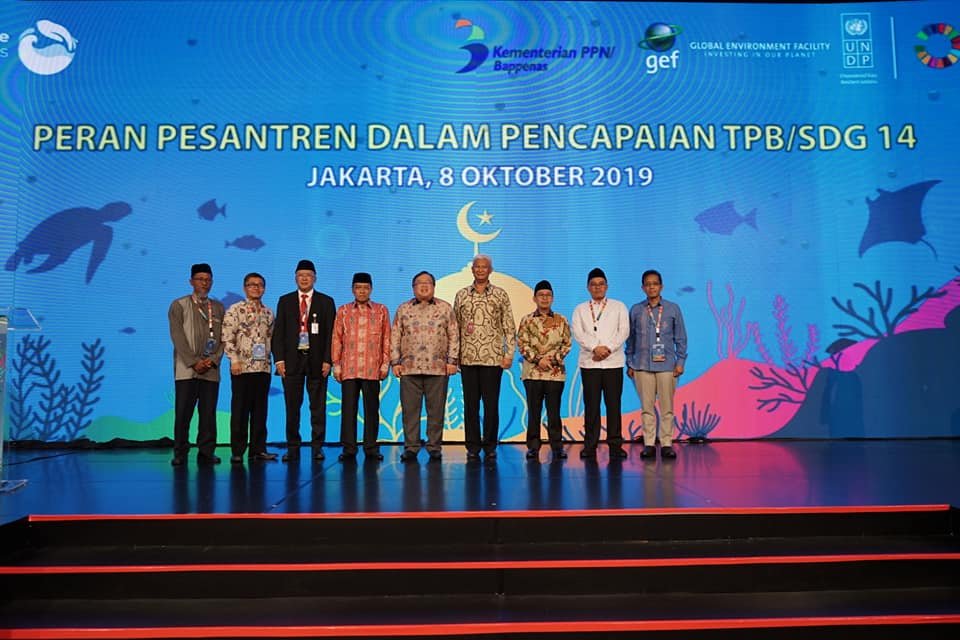 This plenary is closely related to the principle of Sustainable Development Goals (SDGs) which is “no one left behind” which is empower and involve everyone to progressively achieve the SDGs. The SDG Goal-14: Life Below Water consists of three main aspects that are compatible to each other: healthy fisheries which related to sustainable use and production of fisheries, healthy and productive marine ecosystem which related to protection and conservation of ecosystem, and wealthy fisheries which related to improvement of economic wellbeing especially coastal communities such as fishers. This is relevant for Indonesia who continues to actively optimize its national fisheries production. With its complexity, Indonesia fisheries sector needs an integrated management system that considers the integration of upstream to downstream industries, environmental and social economic aspect, and inclusive management which involve all stakeholders. One of key aspect to achieve the target of sustainable fisheries in Indonesia is by effectively implement the regional fisheries management (Wilayah Pengelolaan Perikanan) approach that consider uniqueness, strength, and diversity of marine and fisheries in Indonesia.
This plenary is closely related to the principle of Sustainable Development Goals (SDGs) which is “no one left behind” which is empower and involve everyone to progressively achieve the SDGs. The SDG Goal-14: Life Below Water consists of three main aspects that are compatible to each other: healthy fisheries which related to sustainable use and production of fisheries, healthy and productive marine ecosystem which related to protection and conservation of ecosystem, and wealthy fisheries which related to improvement of economic wellbeing especially coastal communities such as fishers. This is relevant for Indonesia who continues to actively optimize its national fisheries production. With its complexity, Indonesia fisheries sector needs an integrated management system that considers the integration of upstream to downstream industries, environmental and social economic aspect, and inclusive management which involve all stakeholders. One of key aspect to achieve the target of sustainable fisheries in Indonesia is by effectively implement the regional fisheries management (Wilayah Pengelolaan Perikanan) approach that consider uniqueness, strength, and diversity of marine and fisheries in Indonesia.
This plenary is part of the Multistakeholder Platform for Sustainable Fisheries that is launched in 25 July 2019 by Bappenas to provide a collaborative space for stakeholder to support the country efforts towards sustainable fisheries under the umbrella of SDG-14 Working Group. The platform is established through the Global Sustainable Supply Chains for Marine Commodities (GMC project) (2018-2021) implemented by BAPPENAS with technical support from UNDP financed by Global Environment Facility (GEF). The project aims to contribute to the transformation of the seafood market by mainstreaming sustainability in the value chain of important marine commodities.
Contact:
Roby Fadillah
Deputy Director of Institunalisation, Development of Marine Product, and Maritime Affairs
Ministry of National Development Planning/BAPPENAS
roby.fadillah@bappenas.go.id
Jensi Sartin
National Project Coordinator, Global Marine Commodities – UNDP Indonesia,
jensi.sartin@undp.org
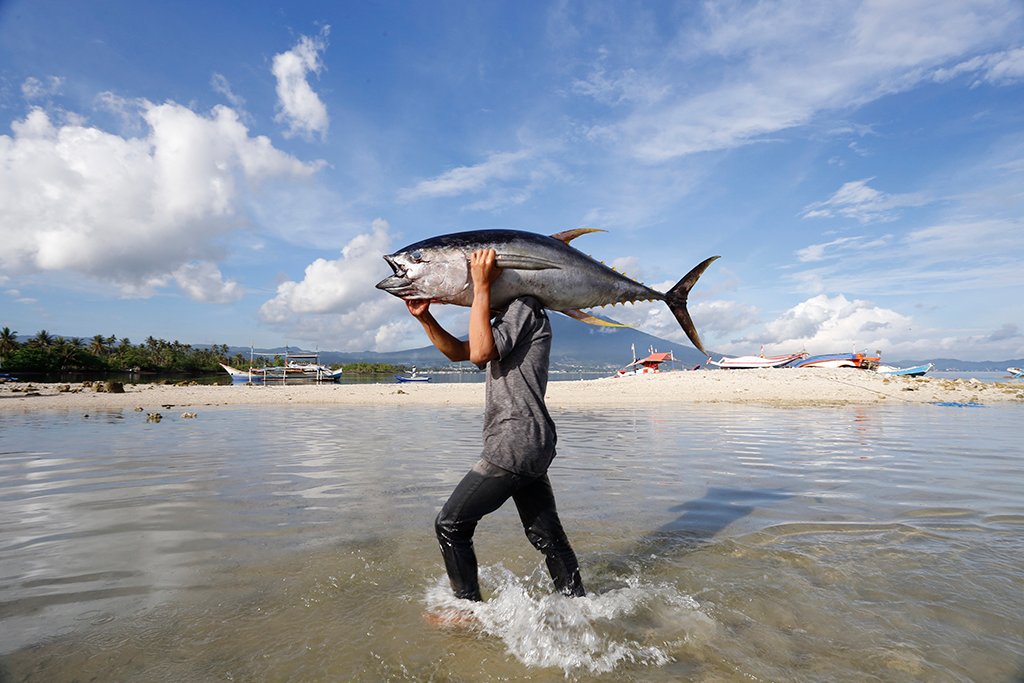 Tuna fisheries in Indonesia are of critical importance to the national economy. Between 2005-2016, Indonesia tuna production comprised approximately 19% of the total landings originating from national capture fisheries. To protect the long-term viability of the tuna fishery, the government of Indonesia is now working to establish sustainable management and conservation measures as guided by the FAO’s Code of Conduct for Responsible Fisheries (CCRF).
Tuna fisheries in Indonesia are of critical importance to the national economy. Between 2005-2016, Indonesia tuna production comprised approximately 19% of the total landings originating from national capture fisheries. To protect the long-term viability of the tuna fishery, the government of Indonesia is now working to establish sustainable management and conservation measures as guided by the FAO’s Code of Conduct for Responsible Fisheries (CCRF).
As the 2015/2019 National Tuna Management Plan enters its final year, the Ministry of National Development Planning (BAPPENAS) facilitated a workshop to support the work of Directorate of Fish Resource Management at the Ministry of Marine Affairs and Fisheries (MMAF) on the Development of the draft National Tuna Management Plan 2020/2024. This workshop was organized with technical support from UNDP through the GEF-funded Global Marine Commodities Project.
“We need to ensure the alignment of this tuna management plan with the 2020/2024 National Mid-Term Development Planning process, and also ensure alignment with SDG14” said Dr. Sri Yanti, Director of Marine Affairs and Fisheries of BAPPENAS, who is also the National Project Director for the GMC Project.
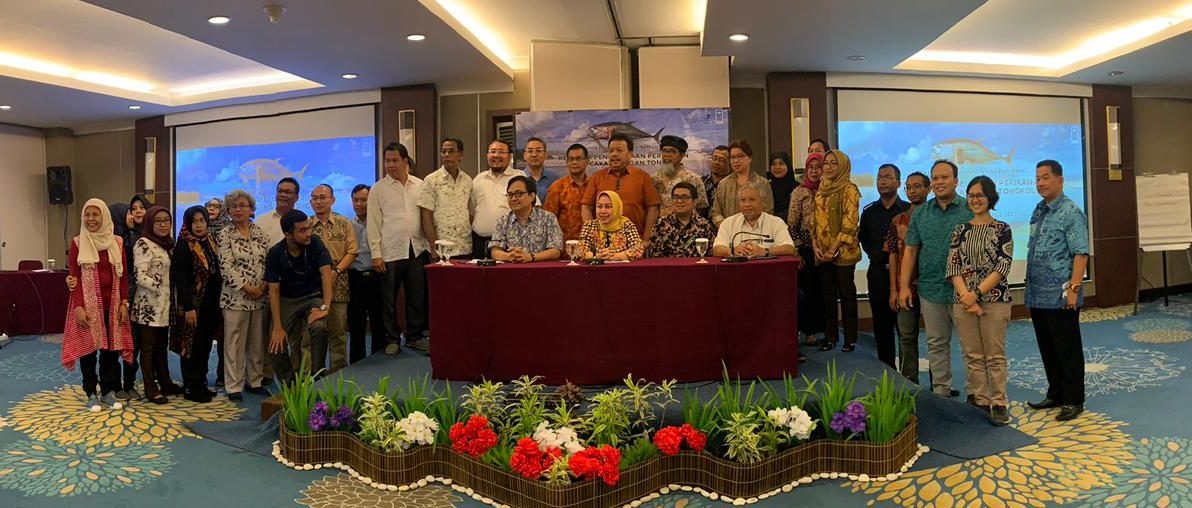
45 stakeholders from MMAF, BAPPENAS, UNDP, representatives of Fisheries and Marine Agencies in the Provincial Government, Fishing Port Authorities, tuna industry associations (AP2HI, ATLI, HNPN, ASPERTADU dan ASTUIN), and NGOs (MDPI, WWF Indonesia, TNC and Hatfield) attended the workshop. Stakeholders discussed the identified issues, indicators, proposed actions, as well as a timeline and responsible parties to implement .
During the 4-days of workshop, stakeholders identified 534 actions that will be included in the 2020-2024 Draft National Tuna Management Plan. This Plan will be finalized by MMAF and is expected to be synergized with the 2020/2024 National Mid-Term Development Planning process to determine priority programmes in the capture fisheries over the next 5-years, ensuring the sustainability and competitiveness of Indonesia tuna fisheries.
More information:
Jensi Sartin
National Project Coordinator
jensi.sartin@undp.org
As a coordinated effort to improve the management of Indonesian fishery resources, the Ministry of National Development Planning (BAPPENAS) officially launched its “Multi-stakeholder Platform for Sustainable Fisheries” as part of The Global Sustainable Supply Chains for Marine Commodities (GMC) project on Thursday, July 25, 2019.
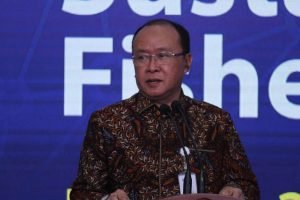
Dr. Arifin Rudiyanto, Deputy Minister for Maritime Affairs and Natural Resources at BAPPENAS
“One of the most important aspects to achieving sustainable fisheries in Indonesia is by effectively implementing a regional fisheries management (WPP) approach,” said Dr. Arifin Rudiyanto, Deputy for Maritime Affairs and Natural Resources at BAPPENAS. The launching event, held in Jakarta, Indonesia, was attended by various fisheries stakeholders including related ministries and agencies, local government, and the fishery industry, youth groups, and academics.
The GMC Project activities in Indonesia are coordinated by BAPPENAS with technical support from the United Nations Development Programme (UNDP) and funding from the Global Environment Facility (GEF). The multi-stakeholder platform is coordinated with efforts to achieve the Sustainable Development Goals (SDGs), especially Goal 14 on Life Below Water.

Sri Yanti, Director for Marine Affairs and Fisheries- BAPPENAS
“With the complexity of the challenges faced and the characteristics of capture fisheries in Indonesia, this multi-stakeholder platform is needed to agree on a shared vision, formulate strategic efforts, and jointly oversee its implementation transparently”, said Dr, Sri Yanti, National Project Director for GMC Project who also serve as Chair of SDG-14 Working Group in the BAPPENAS.
“Collaboration of all parties along the fisheries supply chain – central and local government, academics, partner institutions, youth, women, and fishers – is needed to achieve a just, independent, competitive, and sustainable Indonesian fishery,” said Sri Yanti. Speaking at the launching event, Yanti invited active participation from all fisheries through the multi-stakeholder platform to collaboratively develop a 5-year strategic program for sustainable fisheries.
In addition, the GMC project is working directly to support Fishery Improvement Projects (FIPs) in pole and line tuna as well as the blue swimming crab fishery so that these fisheries can meet internationally recognized sustainability standards in the next 1-2 years. It is expected that these two sectors of fisheries will generate lessons learned and a model for the multi-stakeholder platform in developing policy direction and in improving the sustainability of Indonesia’s fisheries.

Indonesia Multi-stakeholder Platform for Sustainable Fisheries.
The launching was followed by panel discussion with participation from Mr. Askabul Kijo, Head of Fisheries Agency from Southeast Sulawesi Province, Mrs. Janti Djuari, chair the tuna pole and line and handline industry association, who explained urgency for collaboration, Mr. Yudi Nurul Ihsan, coordinator of University network for SDG Goal-14 and Mr. Adrianto chair of Center of Excellence SDG Goal-14 from IPB University. The panelists discussed the lesson learned on governance mechanisms for fisheries management, and strategies to maintain sustainability and effectiveness of the multi-stakeholder platform.
About GMC
The GMC project is an interregional initiative implemented by the Ministries and Bureaus of Fisheries, Production and Planning of Costa Rica, Ecuador, Indonesia and Philippines, with technical support of the United Nations Development Programme (UNDP), facilitated by the Sustainable Fisheries Partnership (SFP) and funded by the Global Environment Facility (GEF).
Flickr photo gallery
More information:
Jensi Sartin
National Project Coordinator
jensi.sartin@undp.org
For thousands of years, fishing has supported the many towns and villages built along the banks of the Galician Rias, or fjord-like bays that spread inland from the Atlantic Ocean in this hilly landscape in northwestern Spain. In 2017, Galicia reported more than 200,000 metric tons of total seafood landings, which represents more than 500 million Euros in sales[1]. Over 70% of seafood consumed in Spain comes off the 4,400 registered fishing vessels in Galician ports, where the industry employs approximately 4.6% of the active population[2]
In a place whose cultural identity and the economy is so closely tied to the fishing sector, it is a government priority to ensure that fish and marine invertebrate stocks are harvested responsibly and sustainably. To prevent overexploitation of the fishery resources, the regional authorities have worked in close coordination with scientists, fisherfolk and the private sector to design management systems that are now internationally recognized for their effectiveness.
 The people and institutions involved in these successful systems shared their experiences, best practices and knowledge with public and private sector delegations from the three countries that receive support from the Global Marine Commodities (GMC) Project in an in-situ peer-to-peer knowledge exchange event organized by project facilitating partner, Sustainable Fisheries Partnership (SFP) from June 26-28 2019.
The people and institutions involved in these successful systems shared their experiences, best practices and knowledge with public and private sector delegations from the three countries that receive support from the Global Marine Commodities (GMC) Project in an in-situ peer-to-peer knowledge exchange event organized by project facilitating partner, Sustainable Fisheries Partnership (SFP) from June 26-28 2019.
“In Galicia, it is very important to properly plan for effective fisheries management. This management consists of three interacting elements,” said Marta Villaverde Acuña, Deputy Director of Fisheries and Seafood Marketing, Regional Government of Galicia.
“The first element is to have scientific data regarding the status of fisheries stocks; the second is that there must be structured mechanisms for consulting fisherfolk and arriving at a consensus about management measures; and the third is that managers consider the social and economic impact of fisheries management measures and strive to guarantee the long-term sustainability of fisheries activities.” Marta Villaverde Acuña, Deputy Director of Fisheries and Seafood Marketing, Regional Government of Galicia.
Those three “elements” were common themes throughout the peer-to-peer knowledge exchange. Ecuadorian, Indonesian and Philippine representatives from the fisheries and planning government agencies, as well as from the private sector were given the opportunity to interact directly with fisheries regulators from the Galician government, with port authorities who monitor and collect data about fish catch and sales, and with fisherfolk from Cofradias, or local fishing development organizations who participate in management plan construction.
The Cofradias were a focus point of the trip, as they represent a unique model of fisherfolk organization that participates directly in decision making regarding the management of Galician fish and marine invertebrate stocks.
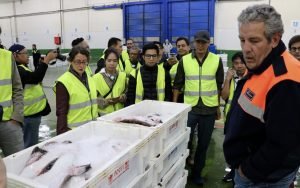
“In the Philippines, similar to the Cofradias, the Technical Working Groups (TWG) are the bodies or platforms that serve as a venue where government entities and fisherfolk can discuss about fishery management activities,” said Rafael Ramiscal, Chief of the Capture Fisheries Division of the Bureau of Fisheries and Aquatic Resources (BFAR).
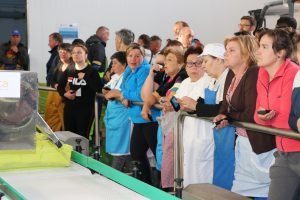 The Cofradias and Cofradia federations have been granted territorial fishing rights by the government of Galicia, and are actively involved in setting harvest quotas, monitoring fishing effort and catch, establishing bans and deciding on the distribution of fishing effort. Through its engagement with the cofradias, the Galician government has been able to effectively involve the private sector in management decision making, thereby improving compliance and facilitating data collection.
The Cofradias and Cofradia federations have been granted territorial fishing rights by the government of Galicia, and are actively involved in setting harvest quotas, monitoring fishing effort and catch, establishing bans and deciding on the distribution of fishing effort. Through its engagement with the cofradias, the Galician government has been able to effectively involve the private sector in management decision making, thereby improving compliance and facilitating data collection.
Viviana Jurado, a biologist from the Ecuadorian National Institute of Fisheries (INP), attended the learning exchange and commented that the event helped reinforce the importance of public-private partnerships to establish good fisheries management plans.
The INP is the Ecuadorian government agency in charge of studying and monitoring fish stocks within Ecuador’s national jurisdiction, and Jurado is currently working on an innovative partnership with the Ecuadorian Small Pelagic Fishery Improvement Project to study the Small Pelagic Fishery stocks.
“Galicia presents a model to learn from, in which there is a very good organization of small-scale fishers in cofradias, who are considered by the regional administration in decision-making,” said Enrique Alonso, Latin America Fisheries Director for SFP.
“The Ecuadorian industry is noticing that independent of which country you are talking about, all the participants here follow the same technical guidelines for fisheries monitoring and research,” Jurado said. “I hope to see the private sector representatives return to Ecuador and share this vision with their industry partners.
Participants were also able to visit several different lonxas or controlled seafood auction centers where catch data is collected, and artisanal and industrial fishers are provided a space to sell their catch to first buyers. At the lonxas, participants learned about the Pesca de Galicia electronic system, which was established by the regional government as a tool to collect data about fishing activities in the Galician jurisdictional waters.
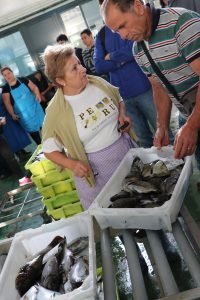 Through the Pesca de Galicia online system, fisherfolk register their fishing journeys, fishing gear utilized, location of catch, total sales by species and other data in designated ATM-like computer stations located at fishing ports across the region. The system can also provide updates to fishers regarding fishery or area closures.
Through the Pesca de Galicia online system, fisherfolk register their fishing journeys, fishing gear utilized, location of catch, total sales by species and other data in designated ATM-like computer stations located at fishing ports across the region. The system can also provide updates to fishers regarding fishery or area closures.
“Our platform ensures that we collect good information at the first sale of the seafood product, which allows us to trace the product from the location it was caught or collected and further along the supply chain,” Acuña said.
“It also ensures that we have reliable and constantly updated information about our fisheries to inform sectorial decision making. For example, the platform can help Sardine fishers track how far along they are toward reaching their total allowable catch of say 40 tons in a season. Once a week the fishers can log in to the system and check the total sum of sardines that he/she has sold this season to make sure they do not pass their limit.”
Rommel Soto, from the Philippines Cephalopods Producers and Exporters Association, said he was impressed with the Pesca de Galicia platform, which facilitates data-informed adaptive management of the Galician fisheries.
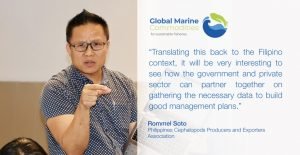
Participants also had the opportunity to share their strategies for addressing challenges related to starting up, implementing and funding the distinct Fisheries Improvement Projects (FIPs) and national platforms (dialogue working tables) supported by the GMC Project.
Regarding the national platforms, Ramiscal commented that “with support of the GMC project, the Blue Swimming Crab and the Octopus Technical Working Groups have institutionalized a form of consultative fisheries management where any management measure is constructed together as a group. This helps improve fisherfolk adoption and compliance with management measures.”
The GMC Project-supported FIPs have multi-year work plans and budgets established to implement actions needed to achieve sustainability certification from either the Marine Stewardship Council, the International Fishmeal and Fish Oil Reduction Standard or simply to improve fisheries sustainability performance of key fisheries
Marinelle Espino, from the Philippine Association of Crab Processors (PACPI), is overseeing the implementation of the Blue Swimming Crab FIP in the Philippines that receives support from the GMC Project. Espino said the primary challenge facing her FIP, which has existed for more than 4 years, is that many of the actions that have been taken to date by the FIP do not necessarily respond to the MSC pre-assessment of the fishery.
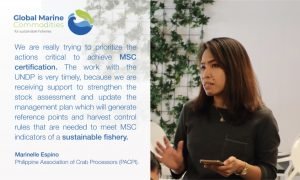
The knowledge exchange event in Galicia provided managers and seafood company representatives with ideas, tools, and models to adapt to their own contexts. Participants expressed their excitement to return to their respective countries and share their new knowledge with colleagues who participate in the GMC Project-facilitated sustainable marine commodity platforms.